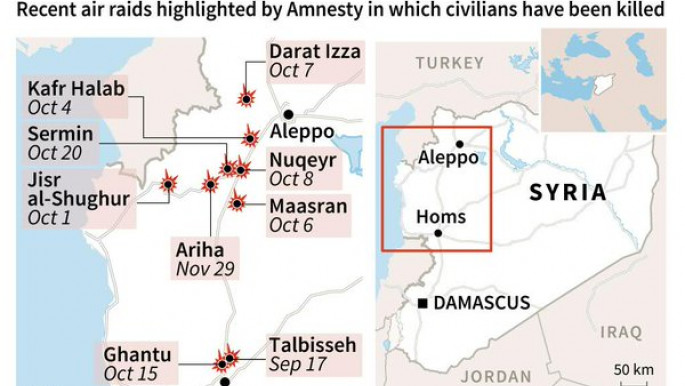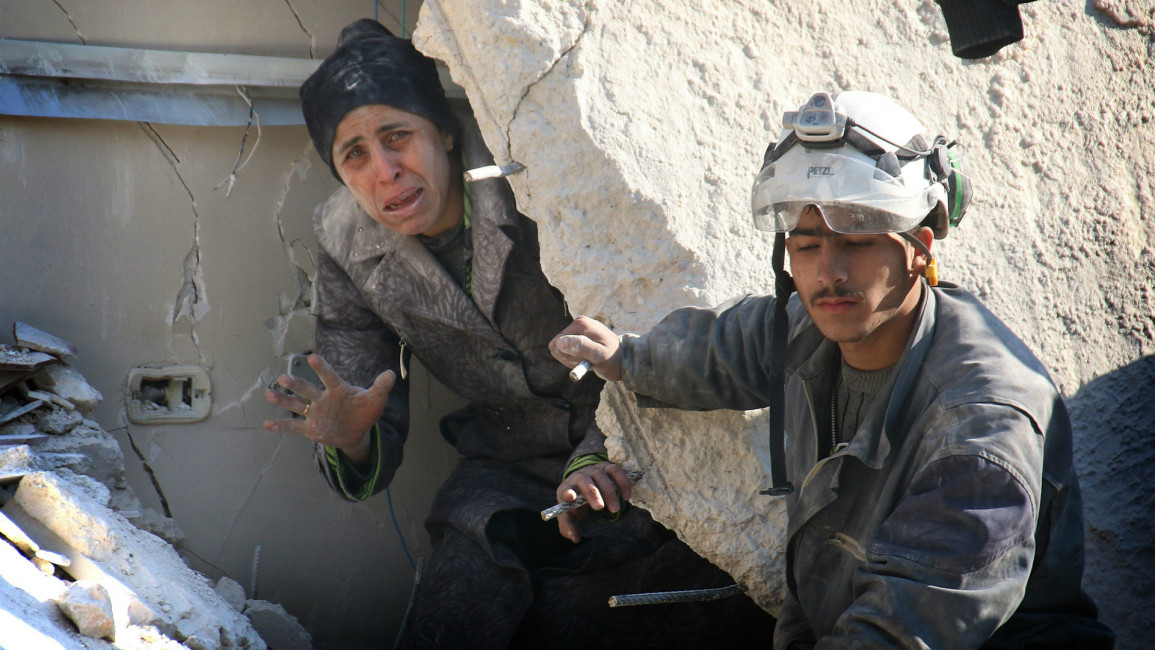Russian raids in Syria may amount to war crimes
Russian airstrikes in Syria have killed hundreds of civilians and caused massive destruction in residential areas, a rights group said on Wednesday.
In a new report Amnesty International highlights the high price civilians have paid for suspected Russian attacks across the country.
At least 200 civilians have been killed so far, with Russian raids hitting many homes, a mosque, a busy market, as well as medical facilities.
Evidence also suggests that Russian authorities may have lied to cover up civilian damage to a mosque from one airstrike and a field hospital in another.
Amnesty also documents evidence suggesting Russia’s use of internationally banned cluster munitions and of unguided bombs in populated residential areas, while focusing on six attacks in Homs, Idlib and Aleppo between September and November 2015.
“Some Russian airstrikes appear to have directly attacked civilians or civilian objects by striking residential areas with no evident military target and even medical facilities, resulting in deaths and injuries to civilians," said Philip Luther, Director of the Middle East and North Africa Programme at Amnesty International.
 |
The attacks may have violated international humanitarian law and may, in some circumstances, constitute war crimes |  |
"Such attacks may amount to war crimes. It is crucial that suspected violations are independently and impartially investigated,” Luther added.
Russia says its air campaign targets the Islamic State group and other "terrorists" but the opposition accuses Moscow of focusing on moderate and Islamist rebels.
Amnesty International interviewed eyewitnesses and survivors of attacks as well as examining video evidence and images showing the aftermath of attacks, aided by analysis by weapons experts.
The attacks were identified as suspected Russian airstrikes by cross-referencing details of each attack with statements from the Russian Ministry of Defence announcing “terrorist” targets struck, or from details about the nature of the attack in witness testimony.
Amnesty's research into these strikes indicate that there were no military targets or fighters in the immediate vicinity of the areas that were struck. 
This suggests the attacks may have violated international humanitarian law and may, in some circumstances, constitute war crimes.
Idlib
In one of the deadliest attacks documented in the briefing three missiles were fired on a busy market in the centre of Ariha in Idlib governorate killing 49 civilians.
Witnesses described how within seconds the bustling Sunday market turned to a scene of carnage.
“In just a few moments, people were screaming, the smell of burning was in the air and there was just chaos. There was a primary school nearby, and children were running out absolutely terrified… there were bodies everywhere, decapitated and mutilated,” said Mohammed Qurabi al-Ghazal, a local media activist.
He saw one woman sitting and crying beside 40 bodies lined up in a row. She had lost her husband and three children.
”Her children were literally in bags. To this day, I cannot get over it,” he added.
 |
In just a few moments, people were screaming, the smell of burning was in the air and there was just chaos. There was a primary school nearby, and children were running out absolutely terrified… there were bodies everywhere, decapitated and mutilated |  |
Homs
In another suspected Russian attack, at least 46 civilians, including 32 children and 11 women who were sheltering for safety in the basement of a residential building, were killed on 15 October in al-Ghantu, Homs governorate.
Video footage of the scene after the attack shows no evidence of a military presence.
Weapons experts who analysed images of the attack said the nature of the destruction indicated possible use of fuel-air explosives (also known as “vacuum bombs”), a type of weapon particularly prone to indiscriminate effects when used in the vicinity of civilians.
Aleppo
In another attack five civilians were killed and a dozen homes were destroyed when a suspected Russian sea-launched cruise missile struck residential buildings in Darat Izza, Aleppo governorate, on 7 October.
“It felt very different from other airstrikes… the ground shook like an earthquake… this was the worst destruction I had seen… A mother and her two children were killed in one house and a young couple in another house. The couple were married about a week before the attack,” said one local witness, who confirmed the area struck was residential and that there were no nearby military bases of any armed groups.
Medical facilities
Suspected Russian airstrikes have also hit hospitals. Medical facilities have special protection under international humanitarian law, and attacking them can amount to a war crime.
A witness to an attack just a few metres from Sermin field hospital in Idlib said the attack appeared to have been carried out by a more sophisticated plane as they did not see or hear the plane before the missiles were dropped.
Amnesty International has also gathered evidence, including photos and video footage, suggesting the Russians have used unguided bombs in densely populated civilian areas, as well as internationally banned deadly cluster munitions.
“Russia must end indiscriminate and other unlawful attacks. They must halt all use of cluster munitions and stop dropping unguided bombs on civilian areas,” said Philip Luther.



